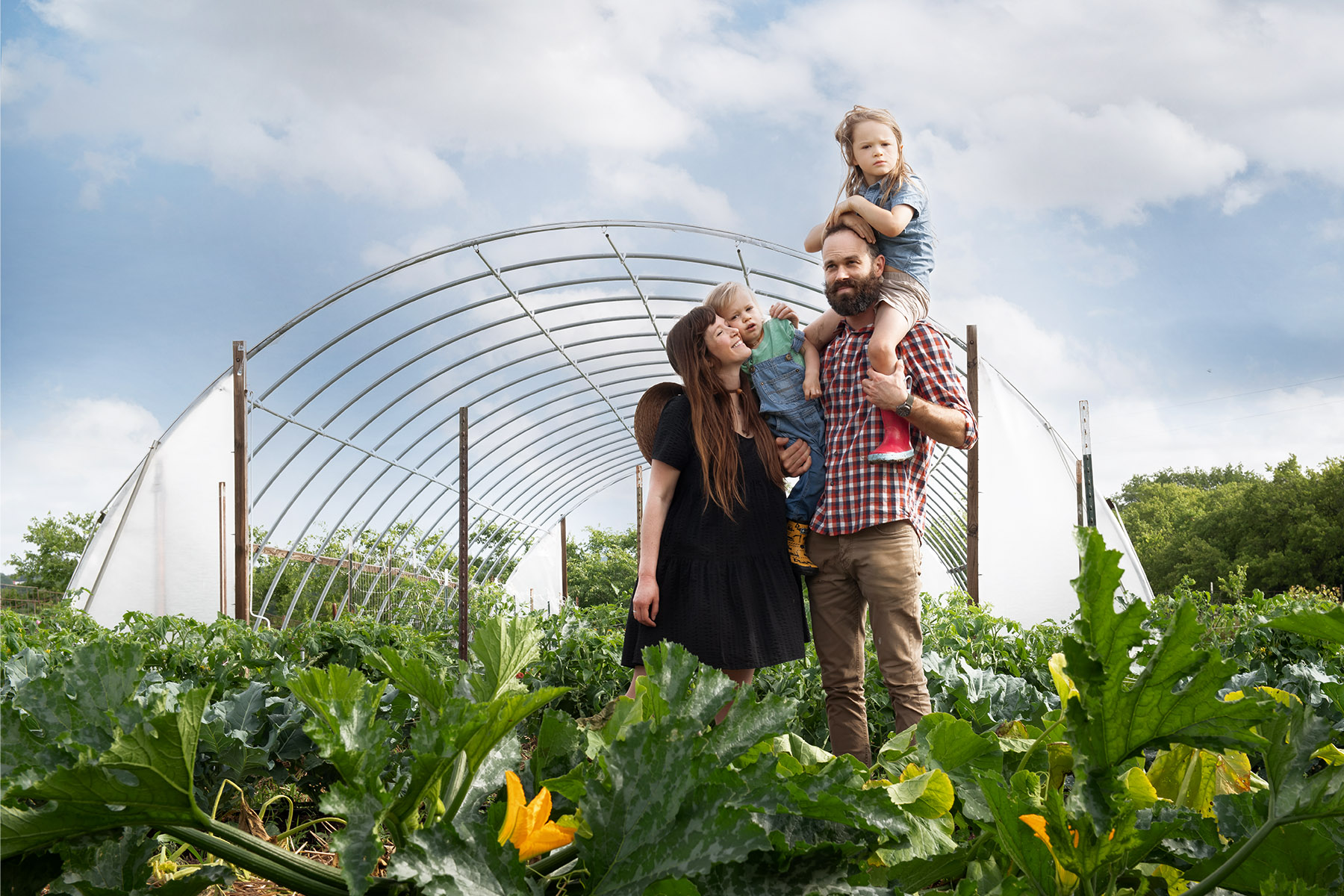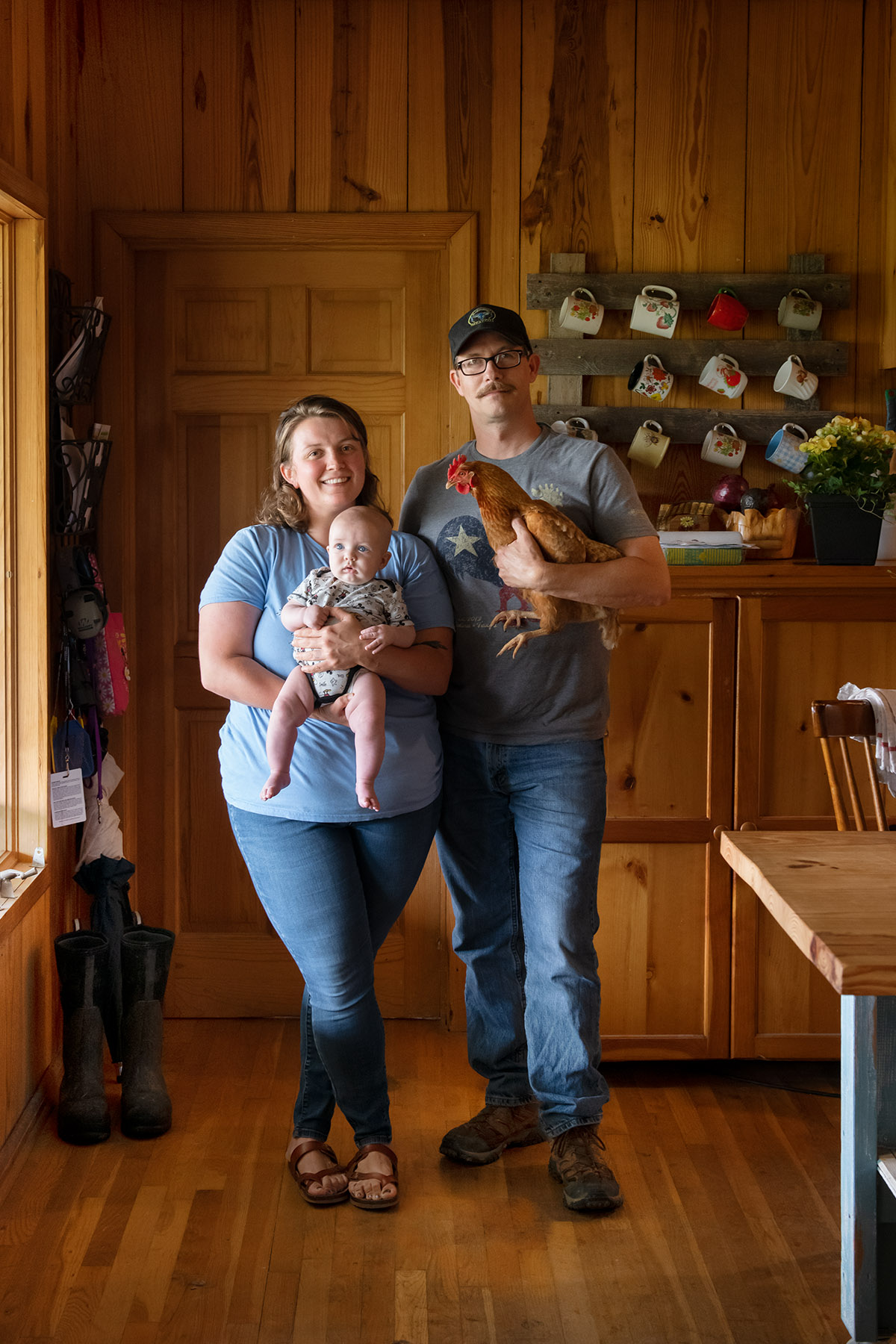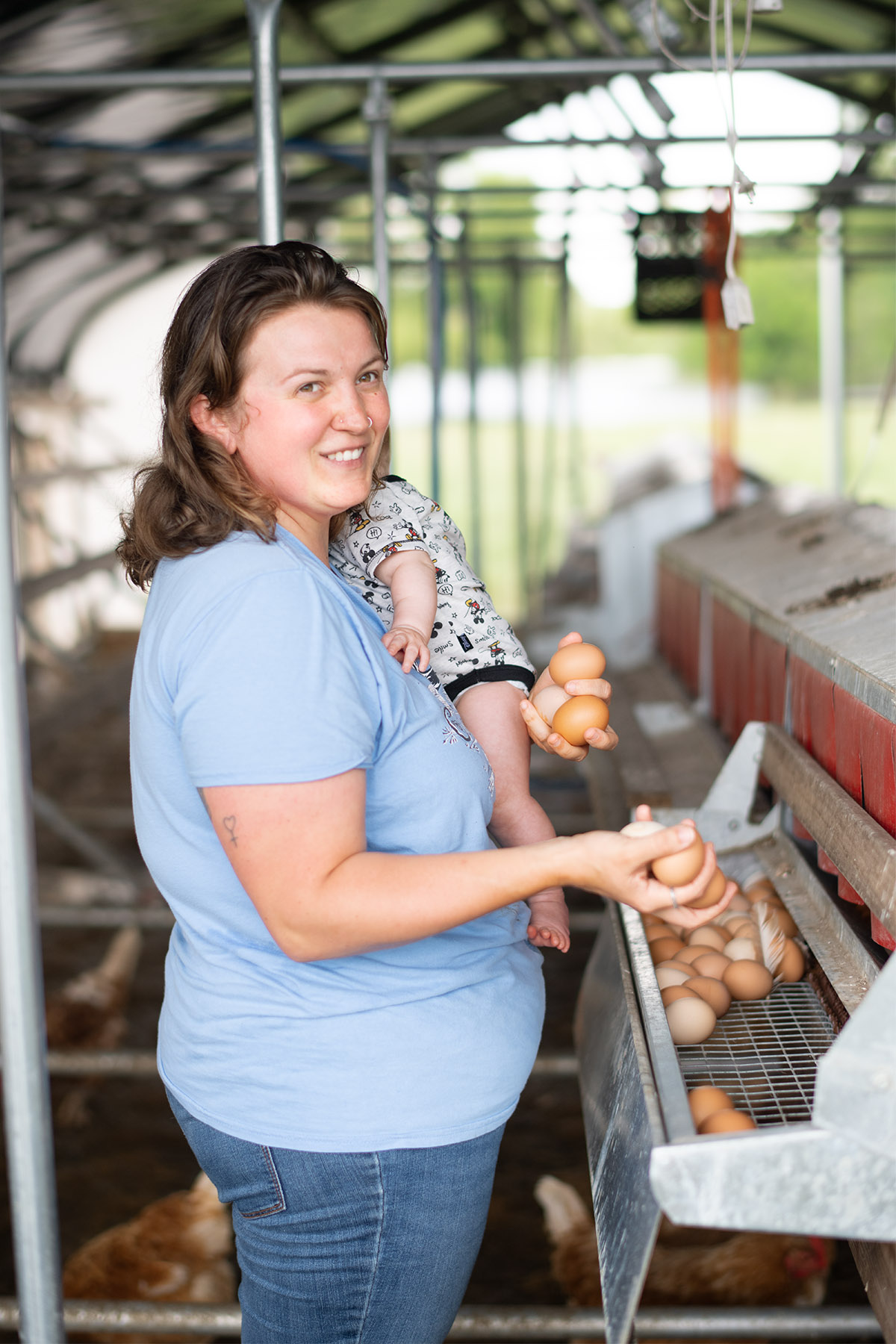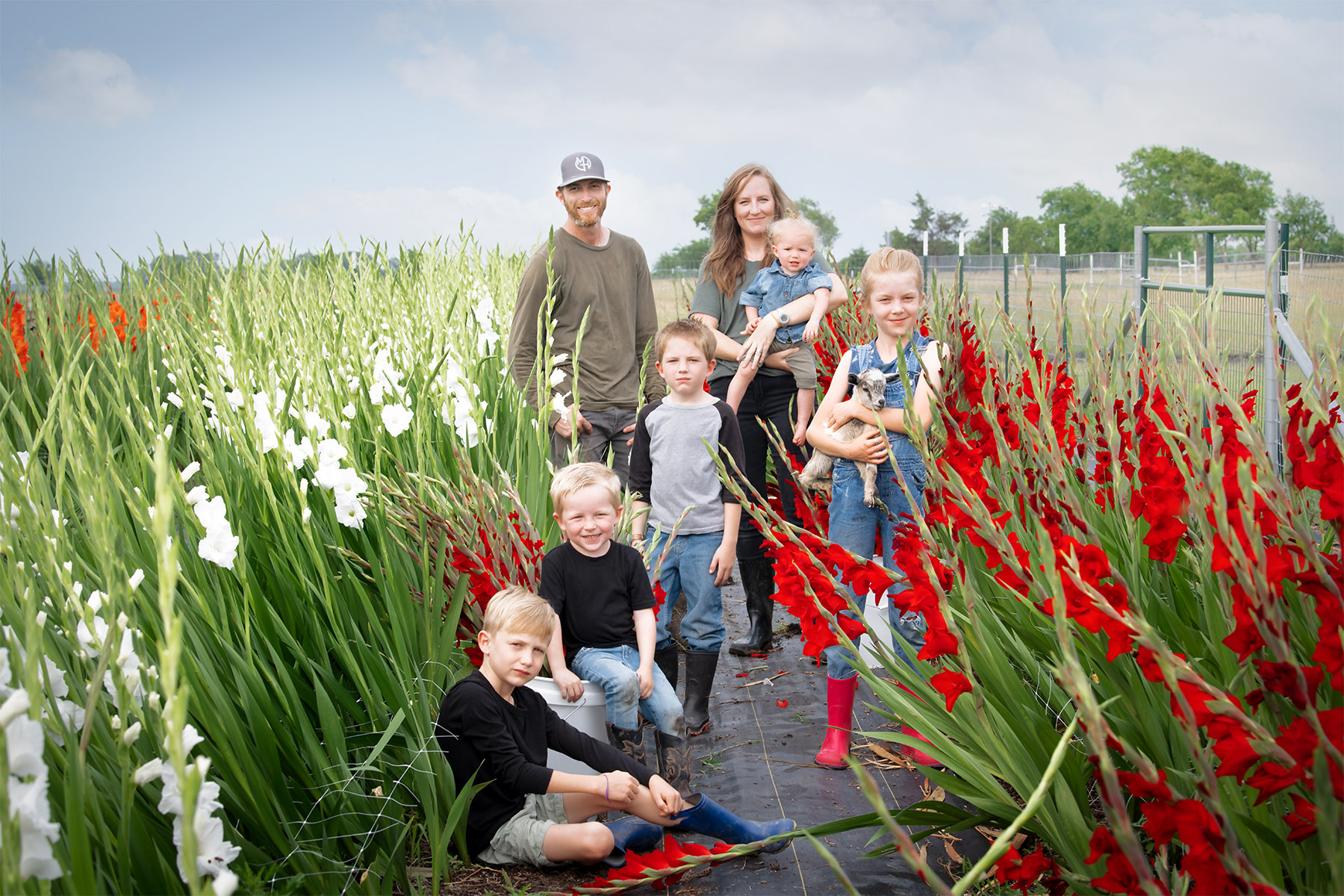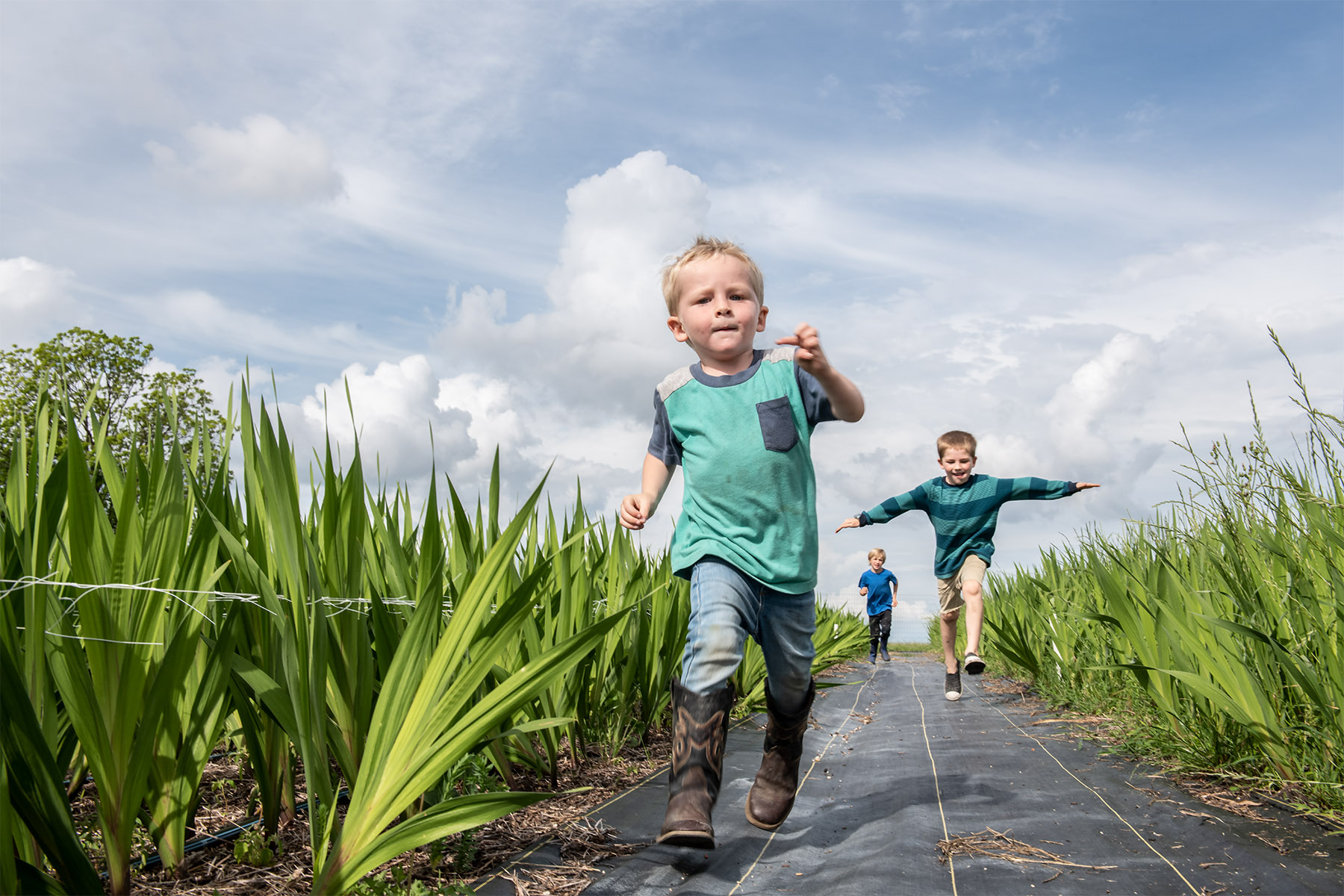Jubilee Farm
Sanger
Est. 2011
Jill was on the run. By the time I arrived at Jubilee Farm on a rainy spring morning, one of Ben Chessman’s two border collies had already escaped to a neighbor’s farm. But he wasn’t concerned; after seven years here in Sanger, the neighbors had become like family. In fact, the grande dame of the country lane happens to be the widow of the grandson of the German immigrant who first built Ben’s farm in 1909. Back then it was a diversified smallholding with vegetables and livestock, enough to support a family. That’s what Ben wants it to be, too, for his wife, Jade, and two young sons, Elijah (5) and Oscar (2).
Over the years, he’s dabbled in pigs and turkeys, but he couldn’t scale up enough to make them profitable. So he has chosen instead to focus on a scant three-quarters of an acre planted to organic standards with neat rows of cabbages, tomatoes, radishes, cucumbers, and zinnias. He has some chickens and a small flock of Dorper sheep, a black-headed South African breed raised for meat, that graze on the hill behind the original barn and outbuildings.
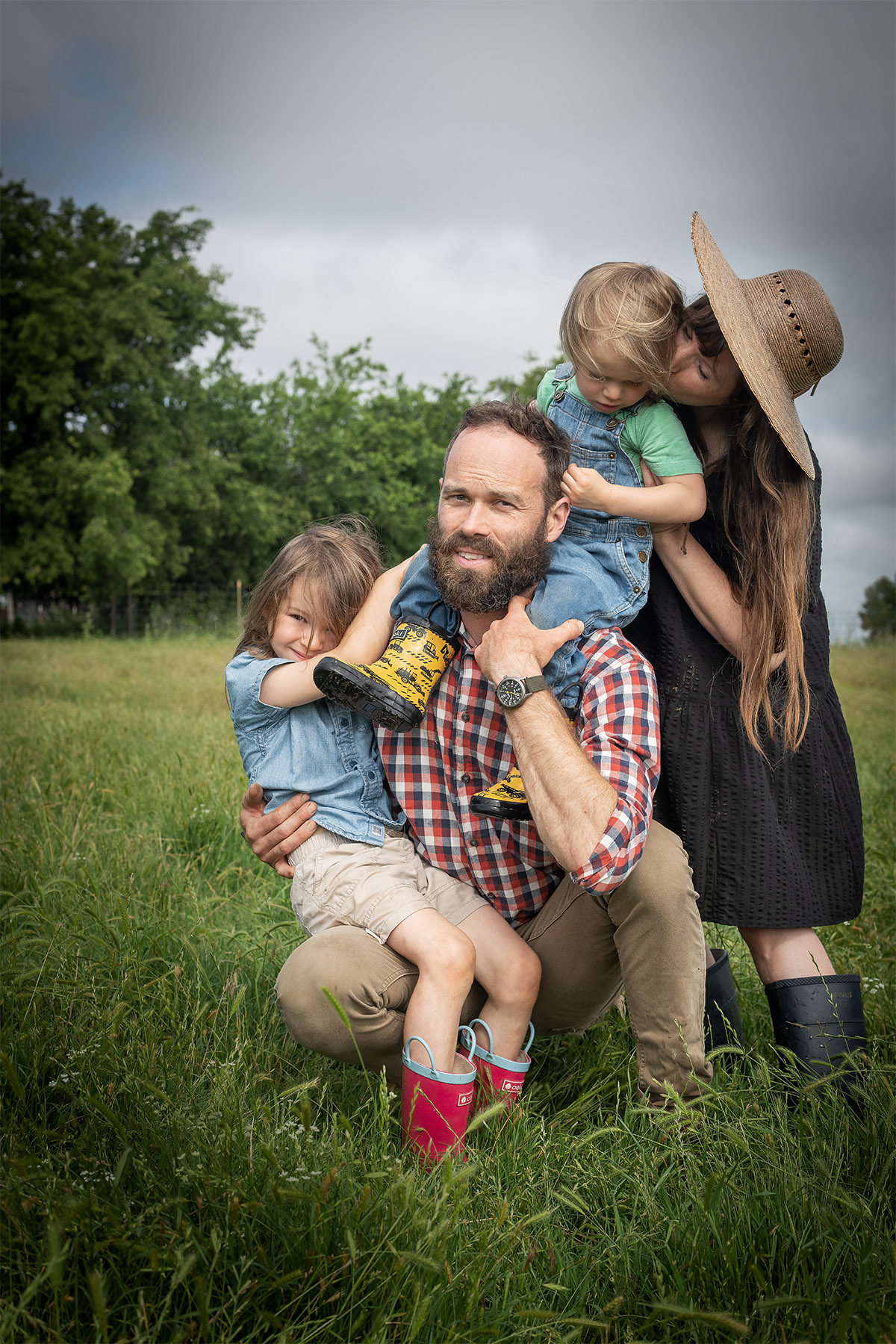
The farm is picturesque but not quiet. The eastern side is bounded by I-35, and a new D14 Airsoft facility hosts fake military battles on the fields just to the north along the creek. The Chessmans picked the property because it has the luxury of being only 15 minutes from their primary farmers market in Denton. They bought it in 2014; Ben says with the rising price of land, they couldn’t afford it now.
As we talk and walk the rows during a break in the rain, Oscar makes an appearance in a tiny pair of Carhartt overalls, pushing a red wheelbarrow. Elijah runs out in a green slicker and pink Wellingtons and heads for the brassicas, where he starts picking off cabbage beetles and squishing them between his fingers, an organic farmer in the making.
“Elijah is genuinely helpful and eager,” Ben says with obvious fatherly pride. “It helps the kind of farming that I do—it doesn’t have a lot of heavy machinery to where it’s dangerous for kids. The plants are more in danger of Elijah chopping them down with a hoe.”
The Wendell Berry devotee is grateful he doesn’t have to shoo them away, that they can be a part of the farm even from a young age and learn that they can have a future in it if they want. “The culture in America and the West is, if you are perceived to have intelligence or any talents that the rest of society deems valuable, you’re not encouraged to farm,” Ben says. “You’re told, ‘You’re too smart for that. It’s too hard. You’re not going to make enough money.’ Rather than appreciating the dignity of it, the value of it to communities and families. So I love having them out here.”
Neither Jade nor Ben were raised on a farm. Jade is a born and bred Highland Park girl, while Ben grew up traveling the country for his father’s job as a soil scientist with the USDA. The couple met in college at UNT, got married in 2010, then Ben convinced his new wife to live out his childhood dream and go work on a farm in Southeastern Pennsylvania for a year. Instead of being dissuaded by the reality, Ben was only more determined. So they decided to move back to Texas, where they could be close to Jade’s family, to put down roots.
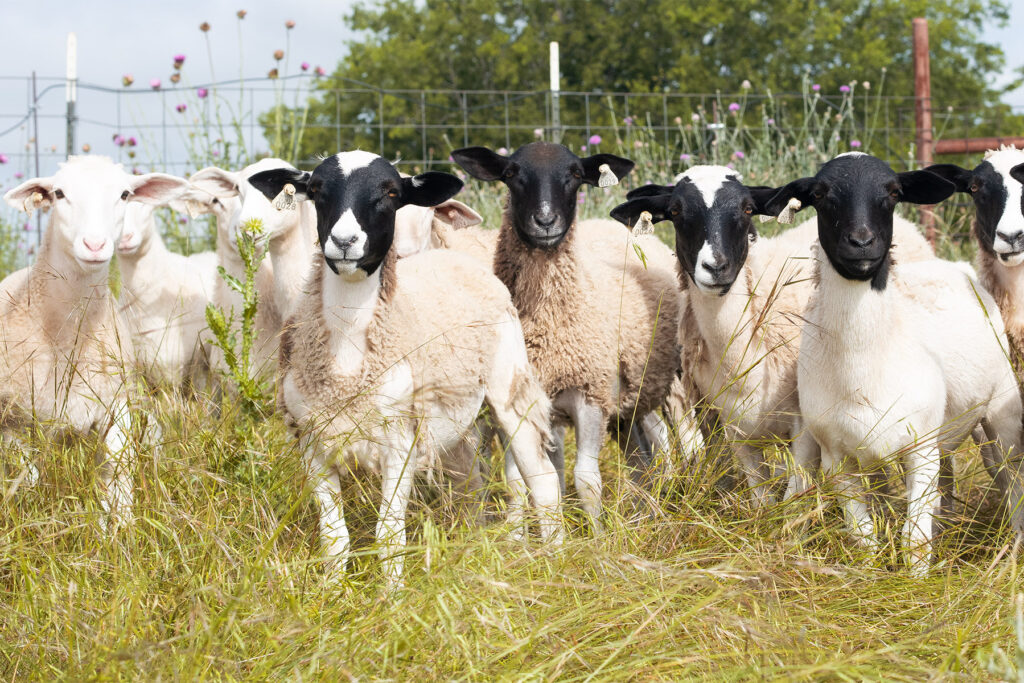
During the pandemic, they had to stop selling at the Denton Community Market and focused instead on home deliveries. Ben thought it would be too complicated, but Jade convinced him they could keep it simple: just a box of veggies for a set price delivered at a set time. It worked. Recently, she started doing cooking videos for Instagram showing people how to cook the vegetables they might be unfamiliar with.
“I grew up in a home where my mom did not cook. She would leave a twenty on the counter and I’d go to La Madeleine,” Jade laughs. “I just grew up never being connected with food and appreciating it. Now, having all of this amazing produce at my disposal, I feel like I’ve fallen in love with food.
“There’s a book called Supper of the Lamb by Robert Capon. He describes cutting open an onion and letting all of your senses be engaged: watching it weep, and seeing all of the layers and the colors, and letting yourself be really engaged, like with a ceremonial process. It just changes everything. Having this farm has really helped me to do that, to let food be something that’s a really celebratory part of our lives.”
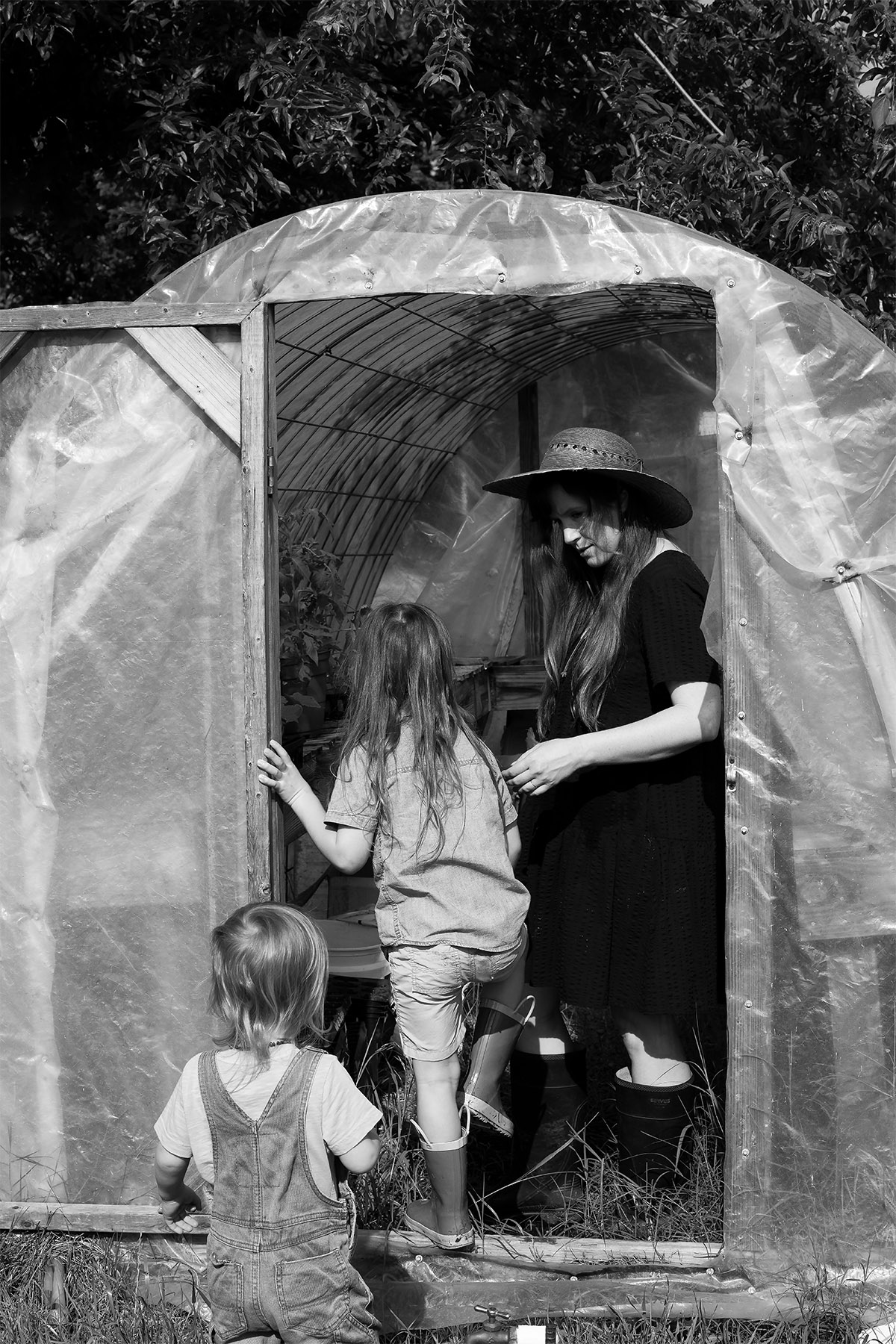
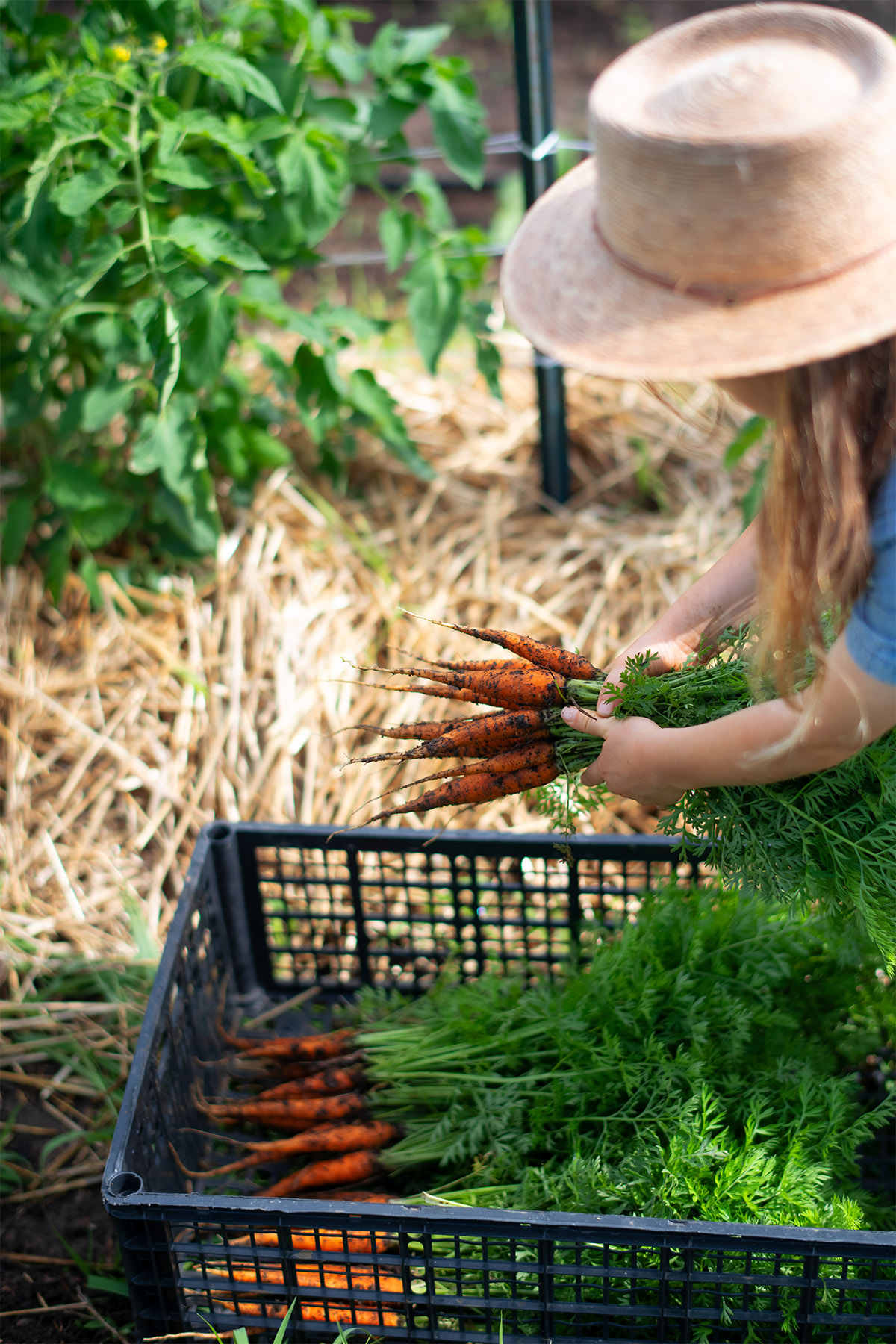
As I get ready to leave, Jade runs inside to grab a jar of pickled okra and garlic that she’s canned for me to take home. Oscar wordlessly takes my hand and leads me up the drive as the sky starts spitting rain. Ben quickly excuses himself to try to get some watermelon and pepper seedlings in the ground. He knows he has to take advantage of this brief window before the skies open up once more.
Follow the farm on Instagram to get updates on the contents of each week’s box of produce, then send the Chessmans an email to get on the list. They only deliver in the Denton area, but you can also find them at the Denton Community Market every Saturday from 9 a.m. to 1 p.m., April to November.
Cartermere Farms
8436 County Rd. 134, Celina | 833-327-6344
Est. 2014
Standing in their farmhouse kitchen of pine and cherry-red tile, Nelson Carter, his wife Hallee Douglass, and their four-month-old son Ruell are a domestic triumvirate, the quiet movers and shakers of a chicken empire.
It’s been a tumultuous year and a half. Before COVID-19 abruptly gutted the restaurant industry, Carter’s 300-acre Cartermere Farms in Celina was one of the largest producers of pastured, organic eggs in North Texas. Dallas’ top chefs clamored for his eggs and for the broilers that landed on their menus. At its apex, the production involved its own poultry processing equipment.
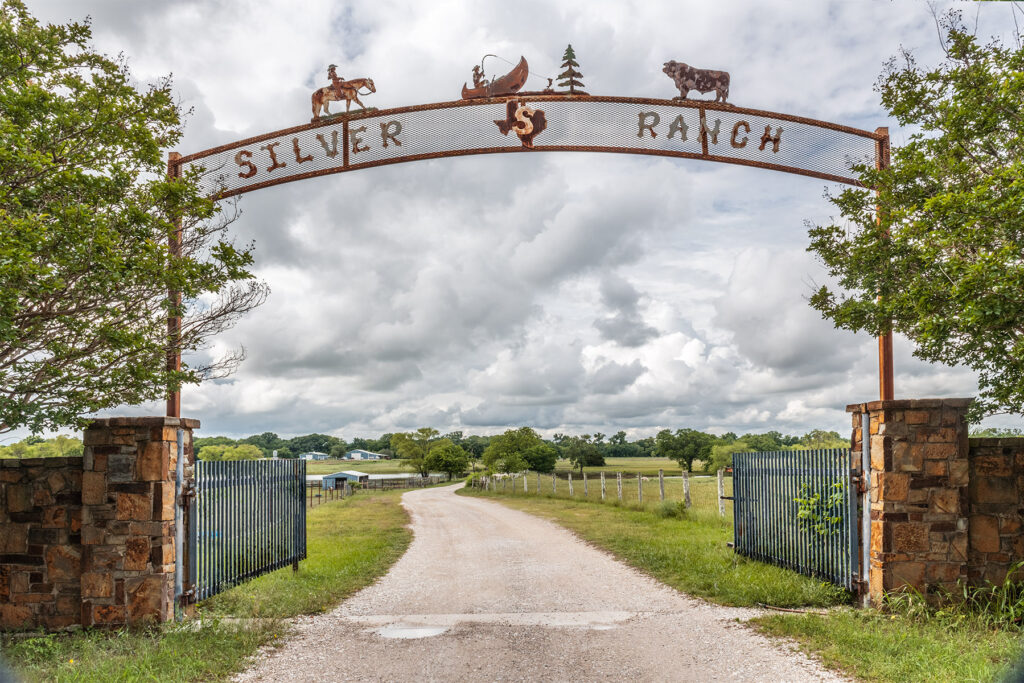
Then, the fall. The rug was pulled out from under them. When restaurants closed by Texas state decree, Carter estimates he lost 98 percent of his business in 48 hours. The ups and downs of agrarian life aren’t new, however.
Carter grew up on farms. His family held land in Frisco and Plano, where they raised sheep and cattle and made hay. In 1997, they bought this parcel down a country road, with a lake and room for the sheep Carter’s sister Jennifer, with a master’s in animal science, wanted to raise.
Carter, just back from a stint in Europe, started building chicken coops, and, in 2014, on a handshake, promised a chef he’d deliver hand-harvested vegetables, honey, and eggs. Soon, he linked up with visionary farm-to-table chefs in Dallas and McKinney like Matt McCallister, Matt Ford, and Robert Lyford and restaurateur Tristan Simon, whose Consilient Group included several restaurants. In 2015, he went all in.
The hen houses sit in the fields, mobile shelters that hold 600, which are moved biweekly to fresh pasture. The hens hunt for bugs and fertilize the native Blackland prairie grasses, enriching the soil and providing forage for livestock. It’s a closed, idyllic ecosystem with red-crested, brown-and-white flecked foul and woolly lambs that gambol.
The result is in the egg yolk. But even these practices didn’t ensure initially the bright, vibrant center Carter needed. In order to please chefs and go from dull yellow to bright orange, he worked with a feed mill to bolster the feed with kelp meal (which also helps reduce the chickens’ body temperature in the brutal summers) and marigold dust. They went from nine-gram to 18-gram yolks and from five to a 13 on a 15-point yolk color wheel. They became the gold standard.
And so Carter knows a thing or two about chickens and eggs, having built his livelihood on two of the first things those looking to save money commoditize. Over the past seven years, the farm has known loss and battled the elements—from severe heat and damaging winds to grasshopper infestations.
But that’s all far away when you step into the field and the chickens put up a murmur. At the end of one of the hen houses, a purple thistle plant is framed by the big, blue sky. We walk back to one of the barn buildings, and Douglass checks on an ailing lamb while I hold Ruell. It’s too early to tell if he’ll take over the business, but he’s had his first tractor ride, pulling a hen house to new fodder.
The brother-and-sister Carters and Douglass don’t know what’s next on this bucolic paradise. For now, people can pick up eggs and pastured lamb from fridges on the front porch. And summer camps teach kids about sustainability, sheep-shearing, poultry husbandry, and how to plant seeds.
“Egg sales could pick up,” Carter says. Connoisseurs of benedicts and golden-tinted pastas know how precious is a rich, golden yolk.
Mars Hill Farm
1604 Mars Hill Rd., Ferris
Est. 2018
Jonathan Herb reluctantly scribbled the words on a chalkboard: “Everything—pick what you want, pay what you want.”
It was only a few months earlier that he’d quit his job to sell flowers. A devout Christian, he’d found digging in the dirt stirred something within him that he wanted to pursue more closely. So with the support of his wife, he turned in his notice and began to grow flowers in the backyard of his Terrell home, in friends’ backyards, and anywhere else he could find a bare plot of dirt.
Since he’d started selling at the Dallas Farmers Market, his stand had become known for good flowers at good prices, typically selling out in hours. But for the first time, he sat and sat, without a single customer. An hour went by. Then another. He was confounded, but he wouldn’t relent.
Finally, a man approached. “Tell me about this chalkboard,” he pried, gesturing toward the sign.
Frustration boiling over, Herb replied, “You really want to know? I’ll tell you what it is. This is a wrestle between me and God.”
It’s a muggy spring morning at Mars Hill Farm, a quick 30-minute drive from downtown Dallas. An occasional rooster crow pierces the air, followed by the thunderous woofs of guard dog Nana, named for the steadfast St. Bernard in Peter Pan.
Herb and Amos Wilson, partners in the farm, kneel on opposite sides of a row of gladiolus sprouts, pulling weeds. With each tug, the soft earth gives way with little resistance thanks to nearly a week straight of rain. Still, it will take them half a day to weed the entire row. There are 11 more rows in this bed; two more beds—each with a dozen rows—await grooming.
The work of growing flowers is labor intensive, but that’s inherent to the mission of Mars Hill, which was created to provide a soft landing place for refugees. The more work there is, the more workers can be accommodated, and the comparatively high return on flowers enables them to earn a true living wage while they plant roots, so to speak. So while the farm is diversified—Herb and his team raise cattle, goats, and egg-laying chickens; grow vegetables; and keep bees—flowers are their bread and butter.
The farm was built on Christian principles by four DFW-area couples: Julie and Trevor Farr; Julia and Blake Schwarz; Tia and Amos Wilson; and Kendall and Jonathan Herb. The Herbs—along with their five children, ages 1 to 9—and Wilsons live on and manage the day-to-day operations of their 100 acres, a portion of which is granted to refugees to use as they please. Though their beliefs shape their work, their goal isn’t to convert anyone to a particular ideology; simply, Herb explains, to love their neighbors despite their differences, and to galvanize others to do the same. “We may have different views on the world. We can talk about that—an open conversation is OK to have—and I think that only happens through relationships,” he says. “Maybe along the way, we can develop a friendship, and we can start learning from one another.”
The farm’s no-till, sustainable methodology—informed by the Bible’s teachings—ensures everything contributes to the health of everything else, naturally building up the land’s resources. Even the farm’s name, a reference to the biblical site where the apostle Paul preached to the Athenians, seems ordained by a higher power, as the farm is located on Mars Road (and on a hill, no less). Indeed, everything here seems touched by a divine hand.
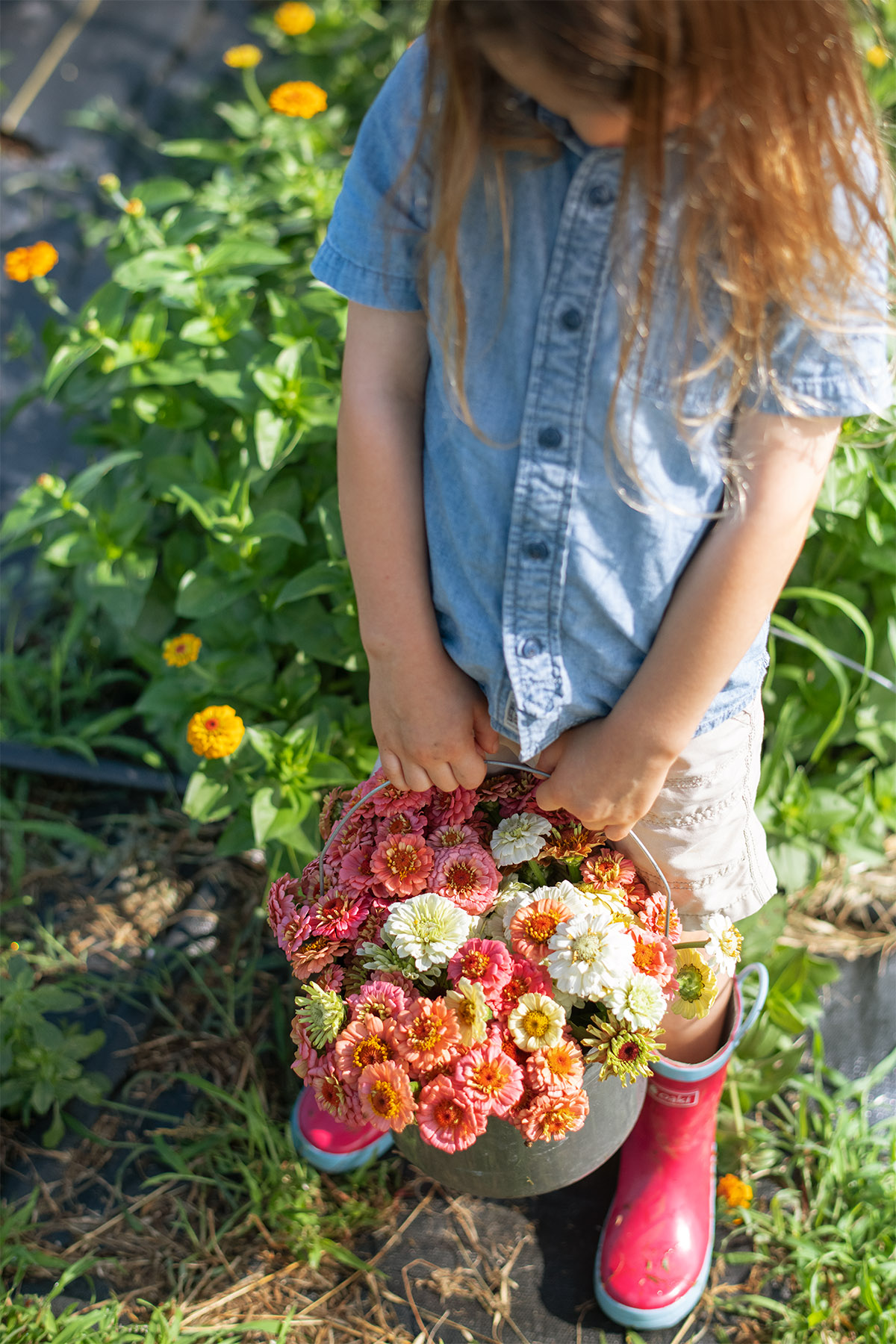
But God’s voice is less prevalent—except for that day at the Farmers Market, when Herb heard clearly the “pay what you want” directive. As he sat, humbled and hesitant, he had an epiphanic revelation that would change the course of his and his family’s life. “I had begun to see my fields of flowers as dollar signs,” says Herb, who, after engaging at length with the inquisitive customer and others that afternoon, suddenly understood God’s message. “I had conversations that day instead of just transactions. And that’s when I said, this is the value.”
Today, Jonathan is putting his sweat and his faith into the rows of gladiolus bulbs—51,000 in all, each hand-planted by Rwandan refugees—that will anchor their first-ever festival, dubbed Glad Fest. He’s been experimenting with ways to draw visitors to the farm—from a rentable events barn to an on-site tiny-house Airbnb—in the hopes of planting seeds of the proverbial variety. “The hope isn’t to spark more people to farm,” he says. “It’s to spark more business owners to think, ‘What does it look like to set aside portions of my business for the benefit of others, rather than just myself?’ ”
It’s a weighty task, and one of the things that keeps him up at night—until he can no longer stave off the exhaustion that comes from long days of farm work. For Jonathan, a suburban kid with a corporate background, the learning curve of farm life has been huge, but he’s devoted himself to his practice, training under the Foundations for Farming organization out of Zimbabwe. On the day of my visit, he expertly pontificates on everything from cattle harvesting best practices to the practical lessons to be extracted from a flourishing weed, all while advising his 7-year-old son, Hudson, on how to manage three goats that escaped their fencing and directing Nana to investigate a stray dog headed in the direction of the longhorns.
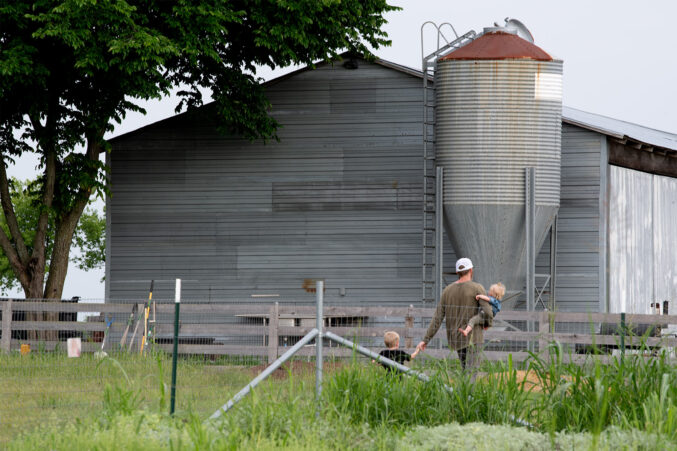
“Sitting down to do the work is the worst work in the world,” Jonathan says of a laborious task like weeding. “But there’s not a lot more satisfaction than going through a garden, weeding it, and at the end of the day, being like, that was good.”
With that, he rejoins Wilson in the back-breaking and soul-stirring work, tending the land of their little farm that’s never just been about what’s growing in the ground.
For more information on cutting days, flower subscriptions, or any of the farm’s other offerings, visit marshillfarm.com or follow them on Instagram. You can also find their goods at the Dallas Farmers Market and Good Local Markets.
Farm to Table
The three farms profiled are but a tiny segment of our local agrarian population. Here, we spotlight a handful of additional farms in our area you can visit, buy from, subscribe to, and support.
Everbloom Fields
What: Flowers
Where: Lancaster, TX
The Details: Sarah Jo Eversole grows a wonderland of flowers on scarcely an 1/8th of an acre in historical Lancaster, where she lives with her husband Matt, son Zebadiah (6), and daughter Ahava (4) in a yellow-and-white historic farmhouse. A former data analyst, she prefers a natural look for the bouquets she harvests for subscribers and farmers market clients.
The field, over which reigns a high-tunnel greenhouse the couple built themselves, blossoms most prolifically March through August. In the tumble of spring, ranunculus and anemones give way to poppies and snapdragons, then summer’s sunflowers and zinnias.
Eversole uses ecofriendly practices, making compost tea from her leaf-rich pile and employing a no-till policy to favor healthy soil biology. She feels connected to the land through cut flower growing. “The history of farming is strong and rich and deep,” she says, trailing her fingers through the blooms.
Floral subscriptions are already full through year’s end, but subscribe to Everbloom’s e-newsletter to learn about signups for the 2022 biweekly bouquet subscriptions, or visit their weekly stand at Saint Michael’s Farmers Market on spring and summer Saturdays. —Eve Hill-Agnus
Profound Microfarms
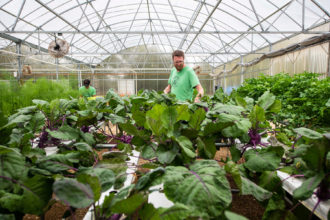
What: Leafy greens and herbs
Where: Lucas, TX
The Details: This sustainably run, two-and-a-half-acre farm—established in 2014 by husband and wife Jeff and Lee Bednar—grows more than 150 varieties of rare culinary herbs, microgreens, and edible flowers that are used by top DFW chefs. Together with more than 20 other area producers, they formed Profound Foods, whose online marketplace is updated weekly. In addition to hosting classes and dinners at their farm, Profound’s products are available for pickup from one of several area locations or via home delivery to 30 zip codes within 50 miles of 75002.
The Bohemian Shepherdess
What: Herb and goat dairy apothecary products
Where: Venus, TX
The Details: Since 2015, owner Mindy Myers has produced lotions, oils, salves, and other nutrient-dense “food for the skin” using botanical herbs and goat’s milk produced on Rosemary Hollow Farm. The family-run farm is organically operated, utilizing pastoral herding methods that make for happy land and happy animals. Products are shoppable via the e-commerce site or through area farmers markets, including the Lakewood and Garland Road Good Local Markets.
Misty Moon Farms
What: Fruits and vegetables
Where: Argyle, TX
The Details: A team of young and spiritually enlightened farmers led by Ross DeOtte grow fruits and vegetables in their 15,000-square-foot greenhouse. Sign up for their 21-week summer and 12-week winter Community Supported Agriculture (CSA) program, which provides you with weekly fruits, veggies, and herbs at their peak of freshness, or pick up their produce at area farmers markets, including Saint Michael’s. You can sign up to volunteer at the farm on Tuesday and Friday mornings, and follow them on Instagram for recipes developed by their greenhouse supervisor.
Pure Land Farm
What: Pick-your-own produce
Where: McKinney, TX
The Details: Father-daughter duo Jack and Megan Neubauer run this 28-acre farm just 10 minutes north of downtown McKinney. In 2018, they abandoned the farmers market circuit in favor of a purely pick-your-own model. Reservations are required and go fast; pick dates are announced on their website and social media channels just days in advance. They also host field trips in spring as part of their mission to educate kids and grownups on how their food is grown. Their informative website details how to pick, store, prep, and cook your haul.
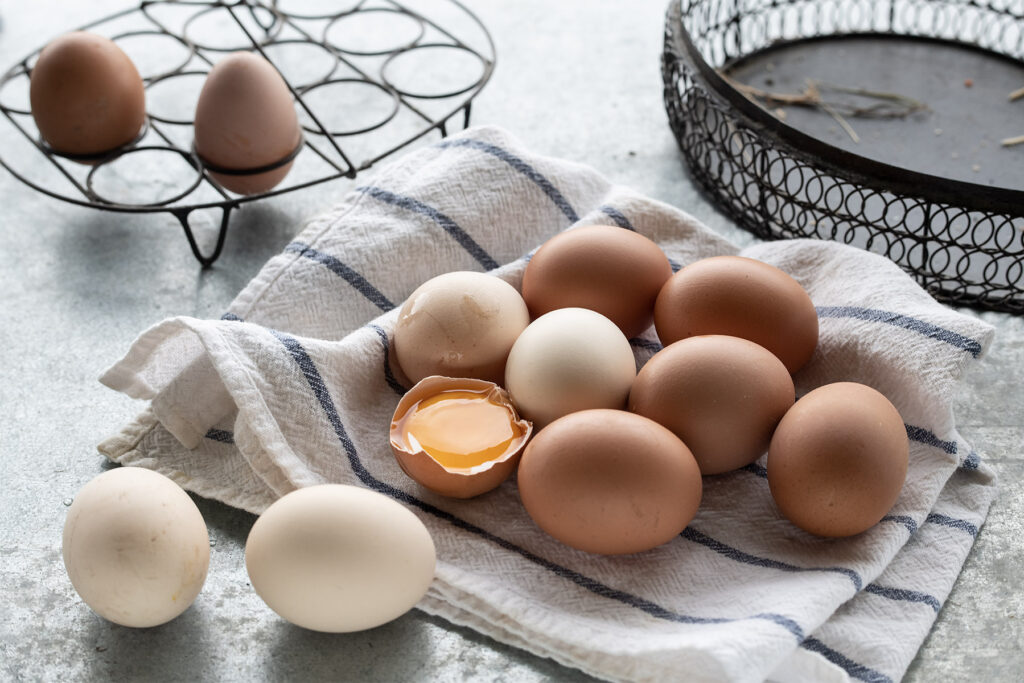
Pasture Perfect
Whether white, pale blue, dusty pink, or all shades of brown, pasture-raised eggs come from hens that freely chase bugs by day and shelter in henhouses at night. The result is a thick, creamy orange yolk. You’ll never go back to store-bought.
- Homeplace Hill Farms, Windom. John “Gordon” Locke and Susie Henderson’s eggs come from five breeds, but mostly Ameraucanas (for blue eggs) and Rhode Island Red and White crosses. Available at the Richardson Farmers Market (Saturdays) and the Texas Community Market in Highland Village (Sundays).
- Bonton Farms, South Dallas. Fed on organic veggies from the urban farm, New Hampshire Reds, Bantans, Copper Marans, French Blacks, and Whiting True Blues create a rainbow of eggs. Available at Bonton Farms, Berkley’s Market, and the Dallas Farmers Market (Saturdays).
- Fruth Farms, Southwest Caddo Mills. Find chicken, duck, goose, guinea, turkey, and quail eggs from this family-owned farm. Available at Good Local Markets Lakewood Village.
- Greer Farm, Daingerfield. Hens roam on 4 acres with berries, beehives, Maine-Anjou cattle, sheep, and pigs. They feast on oyster shells and a peanut-based feed enriched with probiotics. Available at Market Provisions and via Dallas-area delivery every three weeks.
- Cedar Ridge Egg Farm, Pickton. Enriched with alfalfa and hay from the 30-acre farm, Sam Miller’s eggs go into the pasta at Eataly, as well as in dishes at the Kimpton Pittman, Virgin, and Renaissance hotels. Available at Central Market, Market Provisions, Eataly, and the Farmers Market of Grapevine.
Doorstep Delivery
- The Egg Guild Matt Glenn, an attorney, built a chicken coop in his backyard; he now offers weekly and biweekly subscriptions for home egg delivery in Oak Cliff.
- Hood Family Farms Robin and Cheri Hood’s 295-acre farm in East Texas produces enough beef, lamb, chicken, eggs, and flowers to supply subscription services and delivery within 15 miles of downtown Dallas.
- Urban Chicken Inc. For those who dream of backyard fowl without the fuss, John Ramos will handle custom coop construction, pullet acquisition, feed delivery, scheduled cleanings, and even hen-sitting while you’re on vacation.
Write to [email protected]. This story originally appeared in the August issues of D Magazine and D Home with the headline, “Greener Pastures.”


